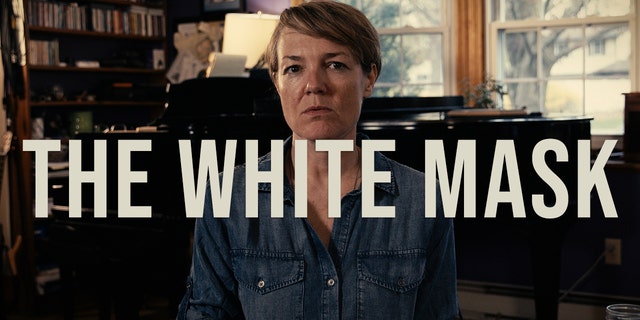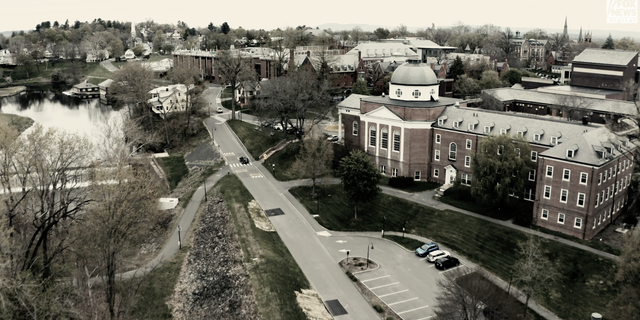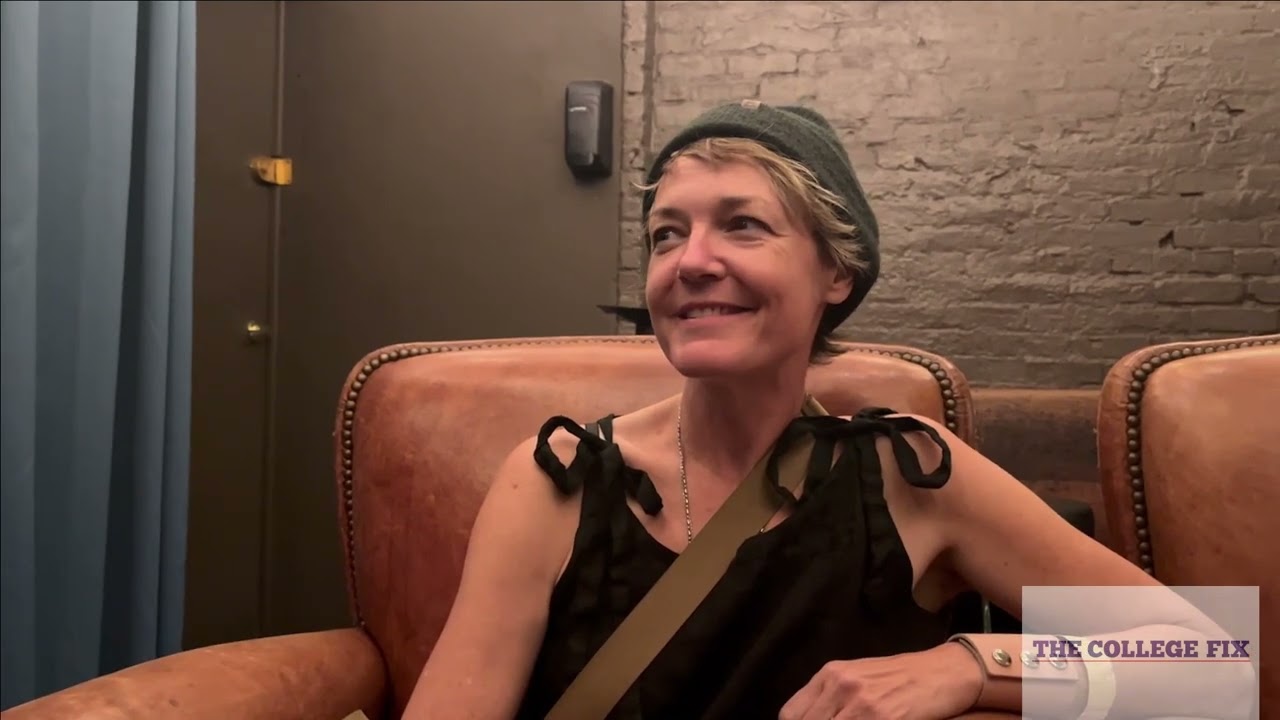Former Smith College employee continues to stand up against identity politics at the school

Over dinner in an Arizona diner, I told two friends that I would soon be traveling to Northampton in the western part of Massachusetts to interview Jodi Shaw, the former Smith College staffer who rebelled against the college’s mandatory racial indoctrination program, a program designed to reduce her humanity to whiteness. My friends then told me a story.
In the 1940s, a black teen left the deep South for the summer to earn college tuition money working the tobacco fields in Connecticut’s Farmington Valley, a short drive from Northampton. The teen marveled that he could sit in church alongside whites, dine in restaurants with whites, and when he faced discrimination, other whites stood up.
After I secured my rental car at the Hartford airport, I drove through Farmington Valley and its fields that no longer produced tobacco. I saw several barns that stood in the 1940s and I imagined, to the best of my abilities, what it would be like to be that teen who found unexpected freedoms in these lands. Down South, he had to hide his rich humanity behind the racial mask of inferiority to conform to the violent racial order of white supremacy that haunted his upbringing. But here, in this valley, when that teen realized that the local whites did not wear the racial mask of superiority and that he was no longer bound to his own racial mask, he felt the exhilarating freedom of allowing his true self to emerge wholly, even if for only the summer.
As I left the valley for Northampton, I wondered if our society today is committing the unpardonable sin of resurrecting these racial masks. I grew up hearing stories of how the racial mask of black inferiority was imposed upon blacks by the racial order of white supremacy. Refusing to conform to this mask meant the loss of a job or being met with violence, beat-downs to lynchings. I also learned how whites embraced the racial mask of superiority as a means to power — a poor white could lack education and wealth and still believe he was superior to the most accomplished of blacks because of the illusion of superiority that his racial mask offered him. Any white that questioned that mask faced being ostracized as a race traitor. And that was how the racial order of white supremacy thrived, by keeping the humanity of these individuals hidden behind racial masks.
There were courageous blacks and whites who rejected these racial masks. They risked everything as they marched in the civil rights movement to destroy white supremacy. But, today I wonder: Have we somehow betrayed the decades-long sacrifices of these marchers by creating a new racial order out of the corpse of white supremacy, a racial order that nearly derailed the life of Jodi Shaw?

Jodi Shaw, former Smith College librarian (Eli Steele)
When I arrived at Jodi’s home the following morning, the door swung wide open and her entire face smiled in greeting. As I stepped into the warm home filled with music, instruments and books, the mother of twins confessed that she was nervous about my visit and then let out a charming laugh. Though it had been over a year since she made national news when she resigned very publicly from her staff position at Smith College and filed a racial discrimination lawsuit against her former employer, her emotions were raw. She was still processing what happened.
For far too long, I have encountered one individual after another whose speech was governed by the fear of saying the unsayable in our hyper-sensitive America. There was none of that in Jodi’s voice. Instead, I heard freedom. The proud Smith College alum says what she pleases and lets her thoughts wander far in hopes of discovering deeper understandings. Yet Jodi will quickly admit that for a period of time she had betrayed this freedom.
Her life began in New England, with parents who were often on the move. While a solid student, swimming was her passion. When she applied to Smith College in the late 1980s she was waitlisted and it was with the help of the college’s swim coach that she secured enrollment. She became an All-American swimmer by her sophomore year.
There was nothing in Jodi that resembled the stereotype of a WASP Smith College student. In fact, she worked the 4 AM shift at a local bakery while attending classes during the day.
After graduating with a degree in anthropology from Smith College in the early 1990s, Jodi led what she described as a very bohemian life. A card-carrying member of the Socialist Party, she traveled out west to New Mexico State University in pursuit of a writing career and discovered music instead. She returned east to New York City right before the Twin Towers fell and pursued a career as a singer and songwriter while working day jobs and living hand to mouth.
I was surprised to learn that she spent years playing her music on the platforms of subway stations. A certain amount of courage is needed to put one’s talents on display like that, especially in a place as honest as New York. As strangers approached and told her their life stories she was often humbled by how wrong her initial judgements of them were. She resolved to practice the difficult discipline of looking at each person as a unique individual.
Her bohemian life ended when Jodi married, had twins, and then divorced. She persuaded her ex-husband to leave their unaffordable Brooklyn neighborhood for Northampton where they would co-parent their children in separate households.
Jodi wanted to return “home” to Northampton out of nostalgia for the “magical times” she had while a student at Smith College. What she had not accounted for was how much the American culture wars had transformed the character of the college since her time there.
She landed a temporary job at Smith College as a librarian. Throughout her first year, she heard phrases like “white privilege,” “systemic racism,” and “white supremacy.” She confessed to me that even though this racially charged culture didn’t sit right with her, she said nothing; a betrayal – in her words - of the lessons she learned about humanity on the subway platforms. She also confided that she had doubted herself because who was she to question the esteemed minds running the college?
So she kept her head down and worked diligently. The college rewarded her with a contract extension and she used that goodwill to apply for a permanent librarian position. She then landed a rare opportunity to prove her worth when she was asked if she could handle the library orientation for the incoming freshmen. She was told that her presentation must be “wild and crazy” because the library orientation was on the last day of a weeklong orientation and the students would be exhausted by then. Jodi smiled, “Well, I’ll do a rap!”

Smith College in Northampton, Massachusetts. (Eli Steele)
Then an incident occurred on July 31, 2018, that changed the campus forever.
A rising sophomore named Oumou Kanoute was eating lunch in the dorm lounge located inside Tyler House when a custodian called the campus police on her. An unarmed officer, Bob Young, approached and asked Kanoute what she was doing there. When she replied that she was working as a teaching assistant, he allowed her to stay. The encounter, recorded by Kanoute on her phone, was civil.
However, Kanoute later posted to Facebook that the encounter left her near “meltdown” since “all I did was be Black.” She also wrote: “It’s outrageous that some people question my being at Smith College, and my existence overall as a woman of color.”
This incident occurred at a time when it seemed that everyday there was a new video of a “Karen,” usually a white woman, questioning the rights of blacks to be where they are**.** The Smith College incident fit into that narrative and media outlets from Boston Globe, Washington Post to CNN ran with Kanoute’s story.
Jodi, too, was appalled by the incident and thought it “terrible.” She nodded along when Smith College President Kathleen McCartney placed the custodian on leave, apologized profusely to Kanoute, and said: “This painful incident reminds us of the ongoing legacy of racism and bias, in which people of color are targeted while simply going about the business of their ordinary lives.” The president also stated that “every Smith staff member will be required to participate in mandatory anti-bias training.”
All of this happened before the wheels of due process could begin to turn.
Then Kanoute made another move three weeks after the incident on July 31. Raised in New York by a family from Mali, Kanoute searched the college’s staff directory for those who she believed called campus police on her. She posted to Facebook the photo of Jackie Blair, the dining room assistant who had asked if she was assigned to eat in that particular house. She also posted the photo of Mark Patenaude and claimed he was the offending custodian. She branded both Jackie and Mark as racists and the post went viral.
If Jodi thought she could escape the toxic cloud of racial strife she soon found out that she was wrong. A week before she was to perform the rap for the incoming freshmen, her supervisor informed her that due to the fallout from the incident on July 31, she could no longer do the rap. She protested that she put in countless hours of work, called in favors from many people, and she demanded to know why. Her supervisor replied: “Because you are white.”
The words stung. Jodie felt impotent. The racial mask of whiteness was now imposed upon her.
If racial masks function as the tools of racial orders, then what was the nature of today’s racial order — one that allowed Kanoute to find power in the black mask of victimization and that reduced Jodi into the mask of oppressive whiteness? Where did this racial order come from?
The roots of America’s identity politics are racial and can be found in white supremacy’s racial classification system that defined the eras of slavery and segregation. It could even be argued that the racial order of white supremacy was America’s very first form of identity politics.
One of the forgotten lessons of the civil rights movement was that my grandparents and so many others marched to destroy the use of race in public affairs. They knew that classifying people by race was poison; the negro box had been marked inferior, the white box superior, and both were lies that had to be destroyed.
After the civil rights victories, we as a nation began to acknowledge our racial sins while knowing that discrimination would not magically disappear overnight. But how could we measure discrimination to ensure that we were on the path to a better America?
Policymakers responded by transforming white supremacy’s white and negro boxes into five primary race boxes: white, black, Hispanic, Asian, and Native American. While the initial intent for these race boxes was to prove racial discrimination, it wasn’t long before a movement within our society saw a larger purpose for these boxes: America’s racial redemption.
Racial orders always use a hierarchy of race to organize people. Americans from every nation on earth were forced into the five race boxes, each with a related historical grievance except for the white box. This grew into a movement known as identity politics, a redemptive order that would racially engineer America to racial justice.
But if classifying people by race was poison, how could the racial order of identity politics use poison to cure centuries of poison?
That was the vicious contradiction that Jodi found herself trapped in. All she saw was increasing racial divisions.
In October of 2018, President McCartney announced that the investigation into what happened on July 31 found no evidence of racism. During the summer months, the Tyler House serves as a dining facility for a summer dance camp attended by young minors. Staffers had to pass background checks and only staffers assigned to Tyler House were permitted to enter.

Smith College campus in Northampton, Massachusetts. (Eli Steele)
That is why Kanoute was out of place when she chose to eat at Tyler House instead of walking across campus to eat at the dorm she had been assigned to. The custodian who reported her was following administrative orders when he let the campus police handle the interaction.
The investigators also found that Jackie Blair — the dining room staffer smeared by Kanoute as a racist - was innocent. And Mark Patenaude? The falsely accused custodian was at his house eating lunch when the incident took place.
These findings provided no reprieve for Jackie and Mark who still remained guilty in the eyes of many. When Jackie tried to return to work she was repeatedly called a racist by Smith College students. Mark’s anxiety became unmanageable and he was forced to take an early retirement, upending the retirement plans he had been working toward for the last two decades.
It was at this moment that President McCartney had the chance to make things right. She could have stood by her staff, an act that would have repaired their reputations considerably. She could have reprimanded Kanoute for racially profiling two innocent staffers and destroying their lives in the process. Instead, the president doubled down and evoked systemic racism as the root cause of what happened on July 31: “It is impossible to rule out the potential role of implicit racial bias.”
President McCartney learned her lesson in 2014. After several blacks were killed by police officers across America, including Michael Brown, the president announced to the college, “All lives matter.” She was lambasted and quickly learned that if she wanted to keep her $600,000 a year job and the campus mansion that she renovated for $3 million, she’d have to wear the white mask and serve the racial order of identity politics.
Jodi found herself being required to attend endless racial sensitivity trainings along with other staffers. She soon learned from her superiors that the qualifications for the permanent librarian position that she was up for had been changed to attract more minority candidates. Jodi saw the writing on the wall and withdrew her application for the position.
She then told me that she thought if she left the academic side of Smith College and took a lower-paying job in the residence life division, she would escape the racial strife. After all, what role can race play in issuing students’ ID cards, handling room changes, and the other tasks that come with running dormitories. What she didn’t know was that most of her new superiors had graduated with master degrees in education where they learned how to see color in every aspect of life. They informed Jodi that they expected the same of her. “But what does it mean to see color?” Jodi wondered.
She found out shortly when a student complained that a fellow student’s service dog was making too much noise in a nearby dorm room. Jodi reviewed the complaint and learned that the student with the service dog had documented multiple efforts to resolve the issue with the complaining student. The complaining student did not provide anything. At that point, Jodi decided the sensible thing was to offer the complaining student a room change since the student with the service dog had legal disability status.
Then Jodi and her superiors learned that the student with the disability was white and that the complaining student was black and none other than Oumou Kanoute. Jodi was ordered to base her decision on the color of the students and that meant moving the student with the disability into a new room, despite her being a senior and a month away from graduating.
Jodi revealed to me that she felt sick to her stomach and ashamed for not standing up for what was right during that ordeal. She also feared that her superior’s orders to engage in blatant racial discrimination put her at legal risk.
Jodi began to feel true loneliness. She reflected on how much the campus had changed since the incident of July 31. Officer Bob Young, affectionately known on campus as “Officer Bob,” had been questionably terminated despite a spotless record for 35 years. A newly hired police chief was also terminated after students posted the chief’s twitter feed around campus and tarred him as a racist. Then Jodi found a list of demands posted to her door and the students warned that if she did not meet them, they would “make (her) feel our pain.”
She chuckled at the absurdity of what she was telling me. She felt like she was going crazy.
To keep her sanity she began to document every incident of racial discrimination that she witnessed on campus and that led to her filing an 80 page internal complaint. Only days after she filed that complaint, George Floyd was killed and the college went into overdrive with its antiracism trainings. Jodi then received a three page response from the college, dismissing her complaints as without merit. (By contrast, the college responded to Kanoute’s Facebook post with a 70 plus page investigative report.)
It was at that moment that Jodi had to make an existential decision: how did she want to live her life from here on? As a conformist to the racial order? Or as a free individual?
Jodi confided to me that the psyche pain of living as a coward who betrayed her morals would be too much for her to bear. After sending out several Hail Mary emails in hopes that her superiors would come to their senses, Jodi summoned the only thing that could save her: courage. Somehow, she instinctively knew that the only antidote to racial orders was courage. And that it was only courage that would lead her out of the racial quagmire and back to her true self.
In October of 2020, Jodi made her first youtube video and blasted Smith College for reducing her to a white mask. When President McCartney released a statement that summarily dismissed Jodi’s first video, the president had no idea that she was dealing with a woman that was no longer bound by fear. Jodi saw the president for the opportunist paper tiger that she was and continued to make video after video. Her loneliness began to fade as she found a powerful online community of Americans cheering her on. This community also gave her the gift of reassuring her that she was indeed not crazy and that only gave her more courage.
In February of 2021, Jodi finally resigned from Smith College and filed her lawsuit alleging racial discrimination. The suit is still pending.
Today, the beautiful campus of Smith College feels like a shell of the elite institution it once was. Bedsheets with “Black Lives Matter” painted onto them hang from buildings as if to warn students and outsiders that dissent from the racial order would not be tolerated. Staffers tiptoe around students, afraid of saying the wrong thing or being in the wrong place at the wrong time. None of the faculty possessed the courage to stand alongside Jodi unequivocally.
As I stood up to leave Jodi’s home, she told me that she felt a little like David taking on the Goliath of Smith College. I nearly dismissed the clichéd analogy when I realized that it was only David out of all the Israelites that possessed the courage to stare down Goliath. There are so few Davids in this world and Jodi Shaw is one of them.
On my way to the Hartford airport, I retraced my path through Farmington Valley. I thought again of that black teen from the deep South who tasted pure freedom in these lands. That teen soon freed himself from the racial mask of black inferiority and became known to the world as Martin Luther King, Jr. That New England of his time had shown him what was possible for all of America and that is why the fight of Jodi Shaw is so important today.
